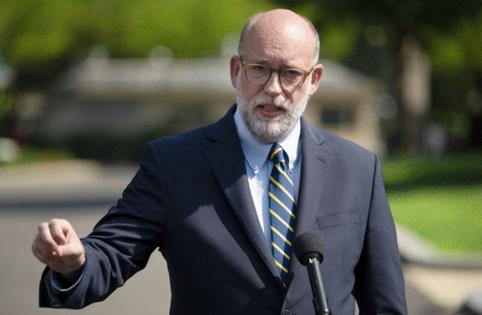Washington state loses more than $1 billion in federal funding for clean energy projects
Published in News & Features
The Department of Energy is canceling $1 billion in federal funding intended to jump-start a green hydrogen hub in the Pacific Northwest.
The federal spending cuts are part of a broader effort announced this week by the White House to scale back spending in Democratic states on clean energy projects and initiatives.
In a post on X on Wednesday, Russell Vought, the director of the Office of Management and Budget, said "nearly $8 billion in Green New Scam funding to fuel the Left's climate agenda is being cancelled … The projects are in the following states: CA, CO, CT, DE, HI, IL, MD, MA, MN, NH, NJ, NM, NY, OR, VT, WA."
Washington state politicians decried the move as a politically motivated attack on states that did not vote for President Donald Trump.
"President Trump’s campaign of political retribution continues, and hardworking Washingtonians are now part of the collateral damage," U.S. Rep. Suzan DelBene, D-Wash., said in a statement.
Washington Gov. Bob Ferguson connected the cuts to the partial government shutdown that began Wednesday.
"It is outrageous that this administration is using a government shutdown to punish blue states like Washington. We’re working with the Attorney General’s Office to fight this illegal action," wrote Ferguson in a social media post.
U.S. Rep. Kim Schrier, D-Wash., said in a statement she would do "all I can to reverse this decision."
U.S. Energy Secretary Chris Wright said in a news release that the canceled grants deliver on Trump's promise to protect taxpayer dollars and expand the country's supply of affordable and reliable energy.
According to DelBene's office, the cuts include more than 200 projects, totaling $7.56 billion nationwide, including $142 million in grants for 10 other projects than the hydrogen hubs in Washington.
The Department of Energy said that following a "thorough, individualized financial review," these projects "did not adequately advance the nation’s energy needs" and do not "justify continued investment."
In 2023, the Department of Energy said it would contribute $1 billion to establish a handful of green hydrogen production sites across Washington, Oregon and Montana. That money would be added to supplement around $5 billion to $6 billion in private funding and eventually be used in agriculture and heavy-duty industry and transportation.
Hydrogen is a colorless, flammable gas that does not emit carbon or other greenhouse gases when combusted. Currently, it is used for producing fertilizer and refining petroleum, though advocates of the technology say it could be used to replace natural gas to heat buildings or power long-haul trucks or ships through hydrogen fuel cells, among other uses.
The funding cuts had been long anticipated since Trump took office. In April, 16 Washington Republican lawmakers submitted a letter to Wright urging the continued funding for the Pacific Northwest hydrogen hub.
Other canceled grants in Washington were awarded to Nippon Dynawave Packaging, Paccar, CleanFiber, Washington State University, Spokane Edo LLC and Silfab Solar, according to DelBene's office. The awards were issued by DOE's office of Clean Energy Demonstrations, Energy Efficiency and Renewable Energy and Manufacturing and Energy Supply Chains.
President of the Pacific Northwest Hydrogen Association, Chris Green, said the termination of funding was a disappointing setback.
"It is a pretty big gut punch for all these companies that have been working so hard on this, including bringing their dollars in from all over the world to make these projects happen, he said.
Green said the organization received the termination notice from the Department of Energy Wednesday evening.
Since the award was announced in 2023, Green said construction has not begun and the organization had been working through permits, design and engineering studies and negotiating contracts.
There is still “significant demand” for hydrogen in the Pacific Northwest and some companies have already indicated they still want to try to move forward, he said. However, it’s too early to know how all the projects will be affected without the federal funding, Green said.
Planned project sites include Bellingham, Richland and Chehalis in Washington, Port of Morrow and Baker City in Oregon and St. Regis, Montana.
Hydrogen is used for refining petroleum, treating metals, producing fertilizer and processing foods, according to the U.S. Energy Information Administration. Nearly all of that hydrogen is called “grey,” meaning it is made with natural gas.
“Green” hydrogen is made by splitting water through an energy-intensive process called electrolysis. Advocates of the burgeoning technology say green hydrogen could clean up hard to decarbonize industries like aviation, maritime shipping and heavy duty manufacturing. However, skeptics of the technology have pointed to the massive amounts of electricity and money it would take to produce green hydrogen at scale.
In 2023, seven hydrogen hubs were announced across the U.S., from California to North and South Dakota, Minnesota, Texas and the mid-Atlantic.
© 2025 The Seattle Times. Visit www.seattletimes.com. Distributed by Tribune Content Agency, LLC.







Comments